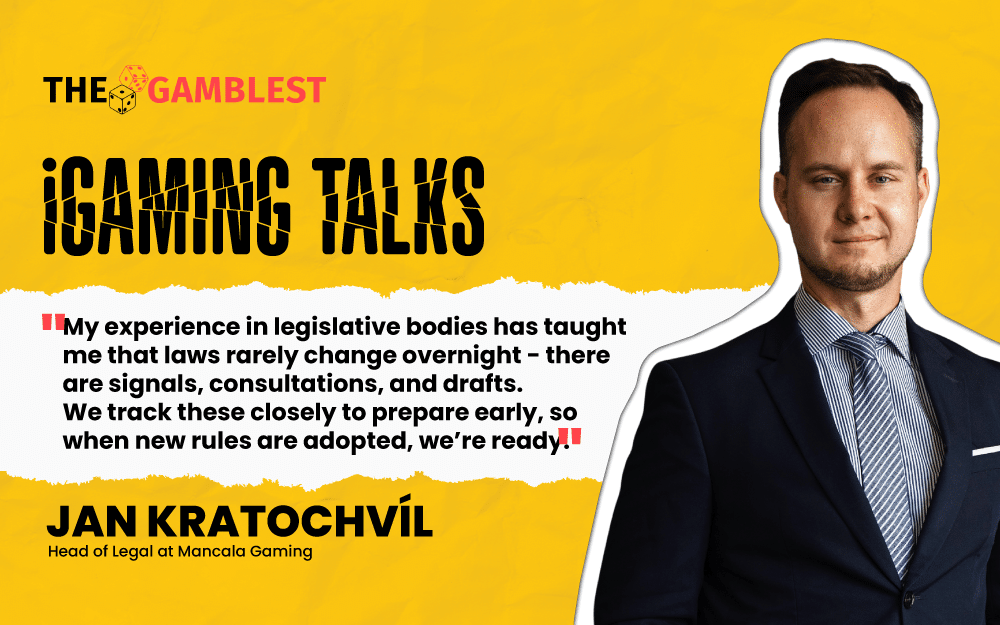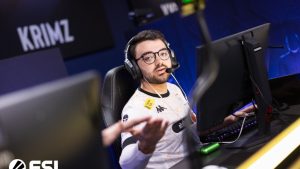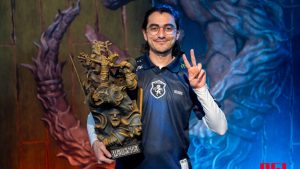
iGaming Talks: Interview with Mancala Gaming’s Jan Kratochvíl
We’re delighted to share another iGaming Talks session with Mancala Gaming’s Head of Legal, Jan Kratochvíl.
In this conversation with TheGamblest, Jan discusses how legal innovation, compliance, and technology shape the future of iGaming. He also reflects on AI’s role in responsible gaming, evolving regulations, and why proactive compliance is now a strategic advantage for game studios.
TheGamblest: Jan, what inspired you to build your career in the iGaming industry, as it is known for its dynamic legal challenges and high growth rate?
Jan: I’ve always been drawn to areas of law where regulation and innovation intersect. My early work in the Czech Parliament and at the Czech Ministry exposed me to the legislative process, while my years at the Law offices, eg. Becker & Poliakoff, and by the Gib-based Lottoland operator, immersed me in the practical complexities of regulated iGaming business on an international scale. iGaming is fascinating because it’s never static — the rules evolve constantly, jurisdictions adapt differently, and new technologies keep challenging us. For running a company Legal department, that means you can’t just “tick boxes.” You need to understand the markets quite deeply and anticipate what’s coming next. That combination of intellectual challenge and dynamic business environment inspired me to stay in this industry.
TheGamblest: Regulations around online gambling are becoming increasingly complex worldwide. How does Mancala Gaming ensure its content meets high compliance standards across different jurisdictions?
Jan: At Mancala Gaming, compliance is part of the DNA of our product development. My legal team works hand-in-hand with our account managers, developers, and commercial colleagues right from the concept stage. We map requirements of the jurisdictions, test against multiple certification frameworks, and apply best practices even where they’re not yet mandatory. The goal is not only to meet minimum legal thresholds, but to exceed them, always in favor of our partners’ trust and operational safety. By embedding compliance early, we streamline our certification processes and avoid costly reworks.
TheGamblest: Anti-money laundering and player verification rules are continuously tightening. From a legal perspective, how do you, Jan, see these frameworks shaping the future of supplier-operator collaboration?
Jan: Stricter AML and KYC regimes are forcing a cultural shift. In the past, suppliers and operators sometimes treated compliance as separate silos. Now, regulators expect a joined-up approach. I believe that suppliers like Mancala Gaming should increasingly act as responsible partner by recognising the compliance duties operators face — not by replacing their AML or KYC systems, but by aligning with their processes and supporting them in meeting those obligations as efficiently as possible. This strengthens collaboration, because compliance becomes a shared responsibility rather than a burden carried only by the operator. Long term, I see this as an opportunity — suppliers who can demonstrate compliance-supportive technology will be the preferred partners.
TheGamblest: Regulatory changes can definitely create uncertainty for suppliers. How does Mancala Gaming prepare to adapt quickly when new laws or responsible gaming guidelines come into effect?
Jan: Flexibility and foresight are key. We continuously monitor regulatory developments, both through in-house expertise and by engaging with external advisors. At the same time, we rely on state-of-the-art regulatory intelligence platforms, including some of the most awarded tools in the industry, to continuously monitor and interpret legislative changes across jurisdictions. Instead of reacting when laws are published, we track regulatory evolution in real time — from draft proposals to consultation papers — which allows us to prepare before obligations become mandatory. This gives us a strategic advantage: rather than simply complying, we can align our roadmap with upcoming expectations and support our partners ahead of deadlines. In practice, this proactive approach transforms regulatory change from a risk into a competitive opportunity. My experience in legislative bodies has taught me that laws rarely change overnight — there are signals, consultations, and drafts. We track these closely to prepare early, so when new rules are adopted, we’re ready.
TheGamblest: Has there been any complex legal or regulatory situation you navigated that you’d like to share? And how did it influence a game launch or partnership?
Jan: One example from my years by the Gib-based operator involved adapting to differing legal requirements across jurisdictions, where the product classification varied dramatically. A game that was considered a lottery in one market could be treated as a odds-betting or casino product in another. Operator had to carefully adapt structures, licensing bases, and responsible gaming features. That experience reinforced my belief that flexibility in design and early legal involvement are crucial. At Mancala Gaming, we also apply this jurisdiction-first mindset, tailoring our compliance approach to the specific requirements of each market rather than forcing a generic template. This strategy has consistently allowed us to enter even the most demanding regions smoothly and confidently.
TheGamblest: Jan, how do you think innovations like AI and data analytics can, or should be used responsibly to strengthen compliance and player protection? As technology is often seen as a driver of both opportunity and risk.
Jan: AI and data analytics are powerful tools, but they must be handled responsibly. On the compliance side, AI can help detect suspicious betting patterns or potential frauds. For player protection, analytics can flag risky behavior and enabling timely interventions. But the legal framework must ensure transparency — players need to understand how their data is used, and regulators must have confidence that algorithms are fair and not biased. I see technology not as a threat, but as an ally to strengthen compliance and responsible gaming, provided we apply robust governance and accountability.
TheGamblest: As you know, smaller studios often struggle with the costs of compliance. What advice would you give to emerging iGaming companies trying to build a compliance framework without slowing innovation?
Jan: My advice is to build compliance into your processes gradually but deliberately. Don’t think of it as a bolt-on cost, but as an investment in credibility. Start with the essentials — clear internal policies, transparent reporting, and awareness of your target jurisdictions. Use third-party labs and compliance consultants strategically to fill gaps without building a large in-house team too early. Also, network — regulators and established suppliers are often willing to share insights. Innovation and compliance are not opposites; in fact, studios that integrate compliance efficiently will have an edge, because operators will see them as lower-risk partners.
TheGamblest: Jan, looking back, which milestone or challenge in the iGaming sphere shaped you the most as a legal professional, and how does that experience influence your approach to responsible gaming today?
Jan: The most formative period for me were the last two years spent at the international Law offices getting in touch with multi-jurisdictional operators, platforms and regulators, followed by nearly seven years by the Gib-based Lottoland brand and two pivotal years by Mancala Gaming. Learning multiple jurisdictions approach at all of these simultaneously gave me a deep appreciation for the complexities of responsible gaming frameworks. Each regulator had its own philosophy, but the common thread was player protection. That shaped my approach: I now see responsible gaming not as a constraint, but as the foundation of sustainable business. As well an influential moment was having the honour of teaching an iGaming seminar at the Faculty of Law of Charles University, my alma mater. Explaining our industry and Gaming law to future lawyers reinforced how important it is to communicate responsibility clearly also to the public. Today at Mancala Gaming, these experiences drive me to make sure every legal and compliance discussion connects back to how we protect our players — because that’s where the trust and long-term success come from.











